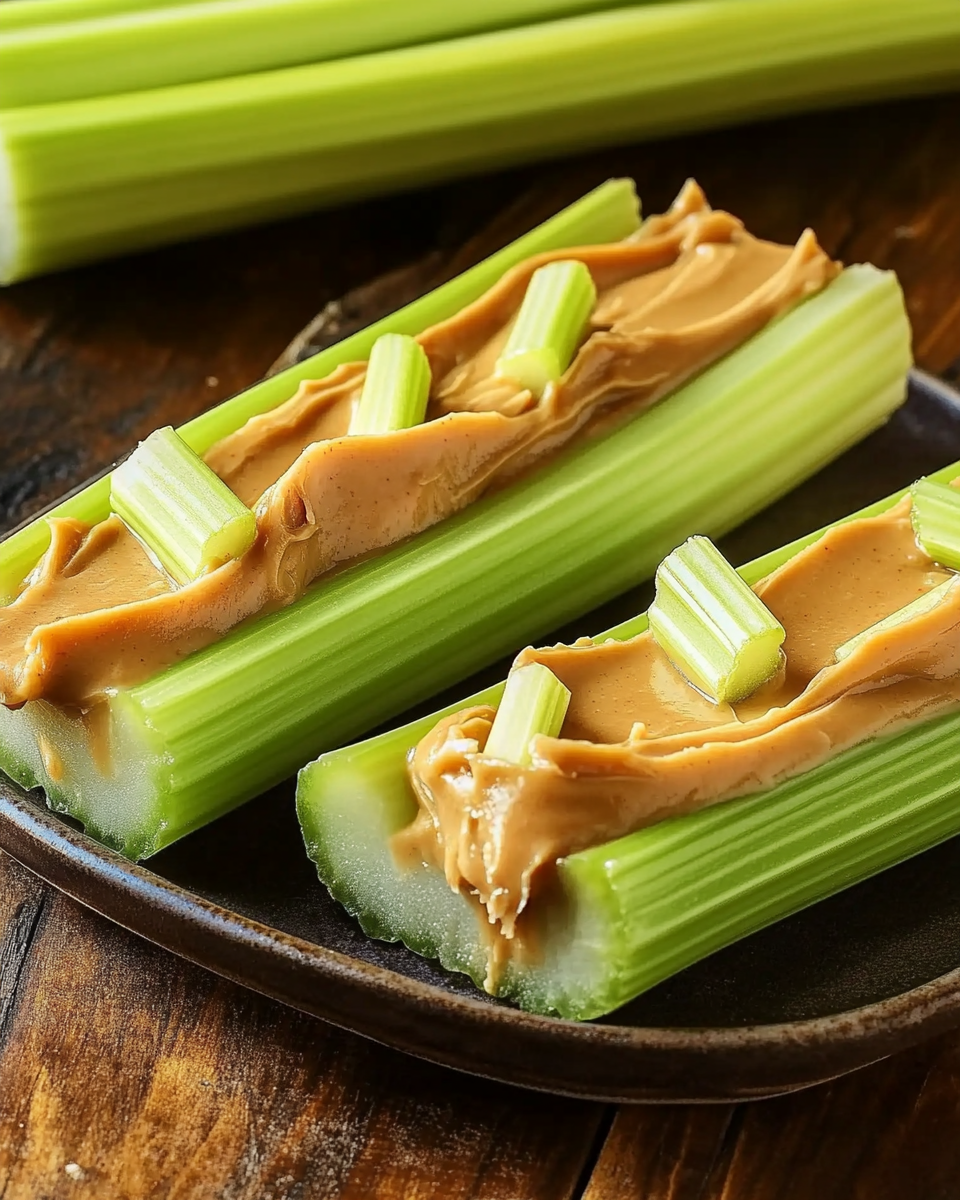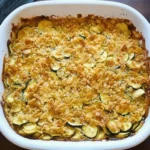A quick, satisfying snack that pairs the crisp freshness of celery with the creamy richness of peanut butter. This low-carb, high-protein combination is perfect for a midday energy boost or a light bite between meals.
FULL RECIPE
Ingredients
- 4 celery stalks
- 4 tablespoons natural peanut butter (unsweetened, no added oils)
- Optional: a pinch of sea salt or a sprinkle of crushed peanuts for garnish
Directions
- Wash and trim the celery stalks, cutting them into 3–4 inch segments.
- Pat the celery dry with a paper towel to ensure the peanut butter sticks well.
- Spread approximately 1 tablespoon of peanut butter evenly along the groove of each celery piece.
- Optionally, top with a light sprinkle of sea salt or crushed peanuts for extra texture and flavor.
- Serve immediately or store in an airtight container in the fridge for up to 1 day.
Nutritional Information
- Calories: 200
- Protein: 7g
- Carbohydrates: 8g (Net carbs: ~4g)
- Fiber: 4g
- Fat: 16g
- Sugar: 2g
Nutritional Benefits of Celery With Peanut Butter
Celery with peanut butter offers a powerful combination of nutrients that support a healthy lifestyle. Celery is known for its low calorie and high water content, making it a hydrating and refreshing snack. It is also a good source of vitamins such as vitamin K, vitamin C, and several B vitamins, along with minerals like potassium and folate. Peanut butter adds protein, healthy fats, and fiber to the mix, which contribute to sustained energy and satiety. This pairing balances the natural crispness of celery with the creamy texture of peanut butter, creating a nutrient-dense snack.
Low-Carb Snack Advantage
For those watching their carbohydrate intake, celery with peanut butter is an excellent choice. Celery is very low in carbs, and peanut butter contains mostly healthy fats and moderate protein with minimal sugars. This makes the snack suitable for low-carb and ketogenic diets. It helps maintain blood sugar levels and provides a steady source of energy without the crash associated with high-carb snacks.
Fiber Content and Digestive Health
The fiber from both celery and peanut butter promotes digestive health by aiding regular bowel movements and improving gut function. Celery provides insoluble fiber that helps bulk stool and moves food through the digestive tract, while peanut butter offers soluble fiber which can help lower cholesterol and improve gut bacteria. Together, they support a healthy digestive system.
Protein for Muscle Maintenance
Peanut butter is a notable source of plant-based protein, crucial for muscle repair and growth. Combining it with celery creates a snack that not only satisfies hunger but also supports muscle maintenance, especially beneficial for those who exercise regularly or follow vegetarian or vegan diets.
Heart Health Considerations
The healthy fats found in peanut butter, primarily monounsaturated and polyunsaturated fats, contribute to heart health by improving cholesterol levels and reducing inflammation. Celery also contains compounds called phthalides that can help relax artery walls and lower blood pressure. Together, they make a heart-friendly snack option.
Hydration and Electrolyte Balance
Celery is composed mostly of water and provides essential electrolytes like potassium, which is vital for maintaining fluid balance, nerve function, and muscle contractions. Eating celery with peanut butter helps support hydration, especially important during hot weather or after physical activity.
Weight Management Support
This snack is filling yet relatively low in calories, making it ideal for those aiming to lose or maintain weight. The fiber and protein content promote feelings of fullness, reducing the likelihood of overeating. The crunchy texture of celery also helps satisfy cravings for something crispy without added calories.
Versatility and Customization
Celery with peanut butter is highly customizable. Some may add raisins to create “ants on a log,” or sprinkle cinnamon or chia seeds for extra flavor and nutrients. It can also be adapted for various dietary restrictions by choosing peanut butter alternatives like almond or sunflower seed butter.
Convenience and Accessibility
This snack is incredibly easy to prepare and requires no cooking, making it perfect for busy lifestyles. It can be packed for school, work, or travel, providing a quick, wholesome option whenever hunger strikes.
Allergy Considerations
Peanut butter is a common allergen, so alternatives like almond butter, cashew butter, or sunflower seed butter can be used for those with peanut allergies. It’s important to check labels for added sugars or unhealthy fats when selecting nut or seed butters.
Antioxidant Properties
Celery contains antioxidants such as flavonoids and vitamin C that help combat oxidative stress and inflammation in the body. Peanut butter also contains antioxidants like vitamin E, which supports skin health and immune function.
Blood Sugar Regulation
Combining the fiber and fat from peanut butter with the low glycemic index of celery helps slow the absorption of sugars, aiding in blood sugar regulation. This makes it a beneficial snack for people with diabetes or those trying to avoid blood sugar spikes.
Bone Health
Celery provides vitamin K, which plays a key role in bone metabolism and calcium regulation. Peanut butter contains magnesium and phosphorus, minerals essential for maintaining strong bones. Together, they contribute to bone health.
Mood and Brain Health
Peanut butter contains nutrients like magnesium, healthy fats, and protein, which support brain function and can positively influence mood and cognitive health. The crunchy texture and taste of celery with peanut butter can also offer a comforting and satisfying sensory experience.
Environmental Impact
Choosing snacks like celery and peanut butter can have a relatively low environmental footprint compared to processed snacks or animal-based products. Plant-based foods generally require less water and energy to produce, contributing to sustainable eating habits.
Storage and Shelf Life
Celery should be stored in the refrigerator and kept fresh by wrapping it in a damp paper towel or storing it in a container. Natural peanut butter can be stored at room temperature but may need stirring as oils separate. Proper storage ensures the snack stays fresh and enjoyable.
Meal Prep and Portion Control
This snack is ideal for meal prepping. Pre-cut celery sticks and portioned servings of peanut butter can be prepared in advance for quick access. Portion control helps avoid overeating, especially with calorie-dense peanut butter.
Taste and Texture Experience
The contrast between the crisp, watery celery and the smooth, rich peanut butter creates a delightful texture combination. This interplay keeps the snack interesting and satisfying to eat.
Suitability for Different Age Groups
Celery with peanut butter can be enjoyed by children, adults, and seniors alike, though young children should be supervised to prevent choking hazards. It is a wholesome, nutrient-rich option that supports growth and development.
Cultural Popularity
This snack is a staple in many cultures, often modified to suit local tastes. It reflects a global appreciation for simple, nutritious foods that require minimal preparation.
Conclusion
Celery with peanut butter is a nutrient-packed, versatile snack that suits a wide range of dietary needs and lifestyles. Its combination of hydration, fiber, protein, and healthy fats supports overall health, from heart and bone health to digestion and weight management. Easy to prepare and customize, it provides a satisfying crunch and creamy richness that can curb hunger and boost energy. Whether you’re looking for a low-carb snack, a quick bite on the go, or a wholesome treat to complement your meals, celery with peanut butter is an excellent choice that balances taste, nutrition, and convenience.





